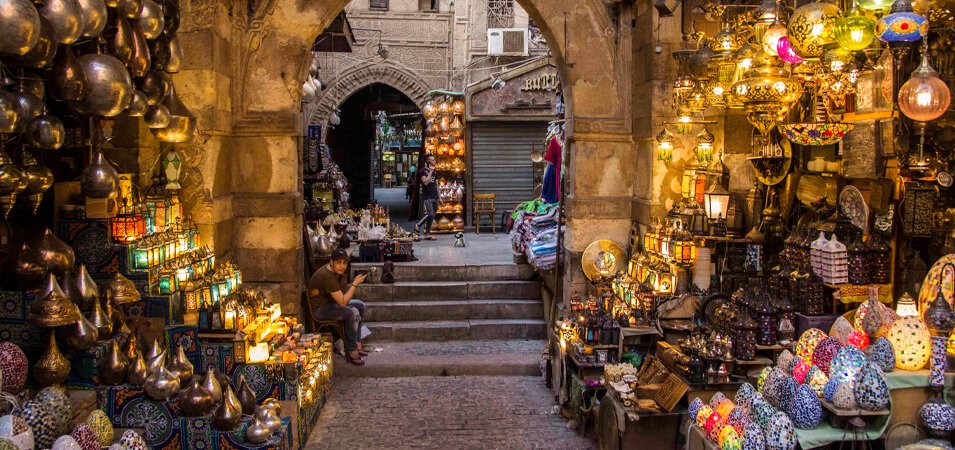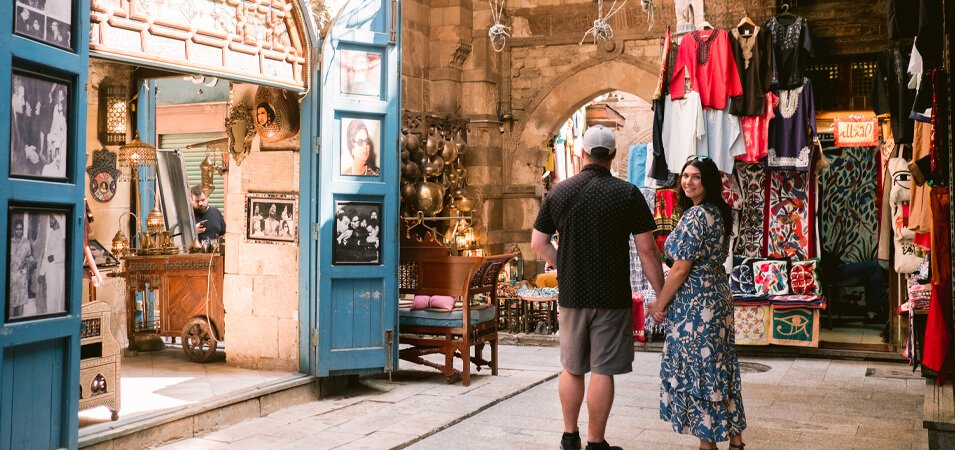Nestled in the heart of Cairo’s bustling Islamic Cairo district, Khan El Khalili is a vibrant market that beckons travelers with its maze of narrow alleys, colorful shops, and the rich scent of spices wafting through the air. For centuries, it has been a hub of commerce and culture, where ancient traditions blend seamlessly with the pulse of modern Egyptian life. Whether you’re looking for intricate jewelry, rare spices, or traditional crafts, Khan El Khalili offers an authentic glimpse into the soul of Cairo.
Dating back to 1382, Khan El Khalili was originally established as a caravanserai (a trading hub for merchants and travelers) during the Mamluk era. Over the centuries, it grew into one of the most famous and historic markets in the Middle East. Today, it remains a key destination for both tourists and locals, offering not only exotic goods but also a sense of timelessness that transports visitors back to medieval Cairo. This guide will take you through the fascinating history, the must-buy items, tips for haggling, and practical advice for navigating the market. Whether you’re a first-time visitor or a seasoned traveler, Khan El Khalili promises an unforgettable experience filled with discovery and excitement.
History of Khan El Khalili

Founding and Origins:
Khan El Khalili was founded in 1382 by the Mamluk Sultan Barquq as a caravanserai, a trading hub for merchants traveling along Egypt’s key trade routes. Positioned strategically in Cairo, the market became a center for the exchange of luxury goods, spices, and textiles, helping to establish Cairo as a major commercial hub in the medieval world.
The Mamluk and Ottoman Influence:
Under the Mamluks, the market grew into a flourishing center for trade, attracting merchants from across the Middle East and beyond. When the Ottomans took control in the 16th century, Khan El Khalili’s prominence only increased. The market became known for high-quality goods like silver, gold jewelry, and fine textiles, while the Ottoman era also saw the construction of grand buildings and mosques around the market, further elevating its status.
Historical Significance:
Over the centuries, Khan El Khalili evolved into a cultural and social hub, not only a commercial center but a gathering place for intellectuals, artisans, and merchants. It became a focal point for both locals and foreign visitors, including traders, pilgrims, and diplomats. The market played a significant role in the growth of Cairo, symbolizing the city’s vibrant Islamic heritage.
Modern-Day Relevance:
Today, Khan El Khalili remains a bustling market that blends historical charm with modern commerce. It is a top destination for both tourists and locals, offering everything from traditional crafts to contemporary goods. Despite the changes over time, the market continues to be a living symbol of Cairo’s rich cultural legacy.
What to Buy at Khan El Khalili?
Khan El Khalili is a treasure trove for shoppers looking to take home a piece of Egypt’s rich cultural heritage. Whether you’re searching for traditional craftsmanship or unique souvenirs, the market offers an impressive variety of items that cater to all tastes and budgets.
Handmade Jewelry:
One of the market’s standout features is its reputation for handcrafted jewelry. Visitors will find intricate silver and gold pieces featuring traditional Egyptian designs, such as pharaonic motifs, hieroglyphic symbols, and cobras. Local artisans also create personalized pieces and amulets believed to bring good luck. Whether you’re looking for an elegant necklace, a bracelet, or a pair of earrings, Khan El Khalili has a wide selection of unique jewelry that blends ancient techniques with contemporary styles.
Spices and Perfumes:
Khan El Khalili is a sensory delight, especially for those who appreciate spices and perfumes. Stalls are filled with vibrant mounds of saffron, cumin, coriander, paprika, and the heady scent of frankincense and myrrh. Traditional Egyptian perfumes, such as attar (a concentrated natural fragrance) are also popular, sold in beautifully crafted glass bottles. Many visitors pick up spice mixes for Egyptian dishes like koshari or molokhia, which add authentic flavor to any home-cooked meal.
Textiles and Clothing:
The market is a colorful paradise for those seeking traditional Egyptian clothing. Galabiyas, loose-fitting robes often worn by Egyptians, are available in a variety of fabrics, colors, and patterns. You’ll also find scarves, shawls, and cotton dresses that feature traditional embroidered designs, making them both beautiful and practical souvenirs. Egyptian cotton products, known for their high quality, are also widely available.
Antiques and Souvenirs:
Khan El Khalili is renowned for its collection of antiques and souvenirs. Stalls offer brass lamps, copperware, and intricate wooden carvings, some dating back to the Ottoman period. Old maps, ceramic pottery, and historical memorabilia can also be found. These items make perfect keepsakes for collectors or those looking for unique gifts with a historical touch.
Art and Craft:
The market is home to a vibrant art scene, where visitors can find hand-painted pottery, calligraphy, and handwoven rugs. Many artisans create one-of-a-kind pieces inspired by traditional Islamic art or Egyptian history. Paintings depicting Cairo’s bustling streets or ancient temples are popular among tourists, as are colorful mosaics and ceramic tiles that evoke the beauty of Egypt’s architectural heritage.
Cultural and Social Experience
The atmosphere of Khan El Khalili is electric, pulsating with the energy of Cairo’s vibrant street life. As you wander through the market’s winding alleyways, you’ll encounter the lively sounds of merchants calling out their wares, the clinking of jewelry, and the aromatic smells of street food and spices filling the air. The market is a melting pot of cultures and traditions, with local artisans often seen working on-site, crafting intricate jewelry, pottery, and textiles. Visitors can stop and watch these skilled craftsmen at work, adding a hands-on, interactive layer to the market experience. Street performances and live music occasionally add to the festive atmosphere, making it not just a shopping trip but a cultural immersion.
Interacting with the locals is a big part of the Khan El Khalili experience. The shopkeepers and vendors, many of whom have worked in the market for generations, are known for their friendliness and hospitality. It’s not uncommon for them to invite visitors into their shops to chat, share stories, and show off their wares. The market fosters a warm, community vibe, where visitors often feel more like guests than tourists. This openness adds to the rich social fabric of the market, making it a place where both locals and visitors connect over shared experiences.
For a more relaxed experience, visitors can retreat to one of the historical cafés around the market, such as El Fishawy, Cairo’s oldest café. Here, you can enjoy a glass of mint tea or a cup of strong Turkish coffee, all while soaking in the traditional ambiance and watching the world go by. The café has been serving patrons for centuries and is an iconic spot where locals and travelers alike gather to socialize.

Khan El Khalili is not just a market—it’s a social hub. You’ll occasionally see religious processions, public events, and celebrations that reflect the area’s deep-rooted cultural and spiritual life. From its bustling streets to its intimate gatherings, Khan El Khalili offers a glimpse into the heart of Cairo’s social and religious fabric.
Visiting Khan El Khalili: Practical Tips
- Best Time to Visit: The best times to visit Khan El Khalili are early in the morning or late afternoon to avoid crowds and the midday heat, especially in the summer. The market comes alive in the late afternoon, making it an ideal time for exploring.
- Opening Hours: Shops are typically open from 10 AM to 11 PM, but during Ramadan, many close earlier, especially in the evenings. Expect the market to be busiest in the late afternoon and evening.
- Safety and Security: Be mindful of your personal belongings in the busy market, as pickpocketing can occur in crowded areas. Always use reputable transportation like taxis or ride-sharing apps (Uber, Careem) to avoid overcharging or confusion.
- Dress Code: Wear comfortable shoes for walking and dress modestly to respect local customs. Light, loose clothing is ideal, especially during warmer months.
- Getting There: Khan El Khalili is easily accessible from Tahrir Square by taxi, ride-sharing apps, or public transport. The nearest metro station is Hussein, a short walk from the market.
- ATM and Currency: It’s best to bring cash in Egyptian pounds (EGP) as many vendors don’t accept cards. There are few ATMs inside the market, so plan to withdraw money before you arrive.
Nearby Attractions
While at Khan El Khalili, you can explore several nearby attractions:
- Al-Azhar Mosque: A short walk away, Al-Azhar Mosque is one of Cairo’s oldest and most important, dating back to 970 AD. It’s a key site for Islamic learning and architecture.
- The Egyptian Museum: Located nearby, The Egyptian Museum is home to world-famous artifacts, including Tutankhamun’s treasures and ancient Egyptian mummies.
- The Citadel of Saladin: Just a short taxi ride away, The Citadel offers stunning views of Cairo and sites like the Mosque of Muhammad Ali and various museums.
- Islamic Cairo: Explore the historic streets of Islamic Cairo, including iconic sites like the Sultan Hassan Mosque and the Mosque of Ibn Tulun, for a deeper look into Cairo’s Islamic heritage.
Food and Dining in and Around Khan El Khalili
Khan El Khalili offers a range of delicious Egyptian food, from street vendors to sit-down cafés.
- Street Food: Try local favorites like koshari (a mix of rice, lentils, and pasta), falafel (crispy chickpea patties), and taameya (fava bean falafel). For dessert, enjoy baklava or kunafa, sweet pastries filled with nuts or cheese.
- Cafés and Restaurants: El Fishawy Café, one of Cairo’s oldest cafés, is a must-visit for mint tea or Turkish coffee and light Egyptian snacks like foul (fava beans).
- Traditional Egyptian Cuisine: For a sit-down meal, visit Felfela for classic dishes like molokhia and grilled meats, or Naguib Mahfouz Café for a more upscale dining experience with dishes like kebab and meze. These spots offer great introductions to Egypt’s culinary staples.
FAQs
Is Khan El Khalili safe for tourists?
Yes, it’s generally safe, but stay alert to pickpockets and keep an eye on your belongings.
Can you haggle at Khan El Khalili?
Yes, bargaining is expected. Start with half the asking price and negotiate from there.
Are there any guided tours available?
Yes, guided tours are available for an in-depth market experience and history. You can book them in advance or on-site.
What types of souvenirs are best to buy?
Popular souvenirs include handmade jewelry, spices, Egyptian perfumes, textiles, and antiques.
What are the market hours?
Most shops are open from 10 AM to 11 PM, though during Ramadan, they may close earlier.
Conclusion
Khan El Khalili offers a unique blend of history, culture, and shopping. As one of Cairo’s oldest markets, it’s a vibrant hub where visitors can explore centuries-old architecture, discover traditional Egyptian crafts, and immerse themselves in the energy of local life. From bargaining for handcrafted jewelry and spices to enjoying a cup of tea at the iconic El Fishawy Café, the market provides an unforgettable experience.
